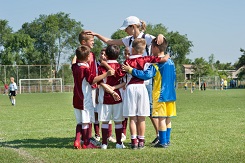
REASONS KIDS BENEFIT FROM PLAYING TEAM SPORTS
KENNEY (KEN) MYERS

Team sports can be traced all the way back to the Native Americans, with the first organized collegiate sport between young men starting in the 1850s between Harvard and Yale. Since then, athletics have become a way of life and an integral part of growing up. Sports in adolescence is becoming more prevalent, and parents are entering kids into sports at younger ages, wanting their kids to experience the many advantages from playing on an organized team.
There are, in fact, myriad benefits a child can receive from playing team sports, ones that can be parlayed into adolescence and adulthood, into relationships and the workplace. Sports are a place where a child can excel and receive scholarships and honors; but they are also a place where a young one can learn many skills that extend far beyond the physical benefits. These skills and benefits range from mental health betterment to learning to work with others, as well as basic life readiness.
Physical Health
The topic of obesity is a prominent one in today’s society, and the importance of exercise is touted more than ever. The health benefits of a child playing sports are far-reaching. Not only does he have fun exercising, but he also has a structured form of activity where he can learn skills such as coordination and agility, and he is able to hone these skills by doing repetitive drills. The physical aspect of sports helps children build muscle and improve motor skills. Research has shown that kids who play team sports are stronger and all-around healthier.
Mental Health
The mental health benefits go hand-in-hand with the physical rewards earned from playing team sports. Athletics promote self-esteem, self-confidence and courage. Children learn what it takes to reach a goal and about their own strengths and abilities. They learn how to deal with the losses in appropriate ways, which can lead to better emotional control off the field. Team sports have been found to enhance a child’s brain development and possibly raise IQ.
Team sports are significantly important to young girls entering adolescence. A very self-conscious time for girls, they are often bombarded with unattainable physical images in magazines, on television and on the Internet. Sports can help young girls realize self-worth outside their appearance and direct their focus toward goals that are more rewarding on the inside.
Working with Others
Team sports teach children how to work well with others. While on a team, children must think of a group as a whole instead of just as themselves as individuals. They learn to be happy for their teammates’ successes in addition to their own, because every person’s success benefits the team. They learn to interact with peers and respect their fellow teammates and coaches. They are able to learn empathy for others.
Playing sports is a way for kids to learn from positive mentors other than parents. On a team, a child learns to respect the coach and honor his final decisions. That sense of organization, teamwork and following a skilled leader will help him in the classroom and the workplace as he grows.
Life Skills
A child or adolescent playing a team sport has the ability to learn essential life skills that he will carry throughout adulthood. Sports often provide valuable learning experiences and teach hard work, patience, persistence, focus and discipline. Children are taught how to respond appropriately to setbacks and failure. They realize that having a strong work ethic toward the sport will bring about good results. They have to learn how to balance school and athletics and, as they get older, part-time jobs as well. In fact, it has been shown that kids who participate in team sports are more likely to be hard-working students and better future workers as adults.
Tips for Parents
It is important for parents to be involved from the beginning to ensure their children are having a positive experience playing sports. While the benefits are numerous, there is still the possibility that a zealous coach or bully can sour the experience for the child. Also, it may take many tries to find the right sport, but knowing why a child wants to play helps guide the child toward the activity that makes the most of his talents. The American Academy of Pediatrics recommends age six as the earliest to enter a child into sports, as free play is most important before then. After age six, the child will likely want to have fun and make new friends in a sport.
Team sports can develop a large range of skills and give a child confidence, self-esteem and independence. With the right focus of both parents and coaches, athletics give children a way to discover their talents in a healthy environment. With the social, physical and mental health benefits, as well as life experience, team sports can lay the foundation outside of school to ensure a child is on his way to becoming a well-rounded, self-assured adult.
http://www.kenneymyers.com/blog/reasons-kids-benefit-from-playing-team-sports/
